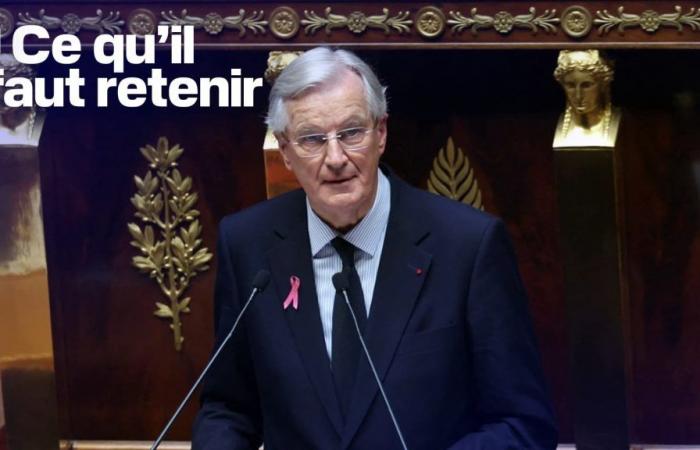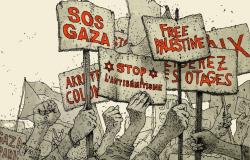Michel Barnier delivered his general policy declaration to the National Assembly on Tuesday, October 1, almost a month after his appointment as Prime Minister. A speech that he made under pressure in the face of the absence of an absolute majority in the National Assembly. To which is added an explosive financial situation, while the deficit risks reaching 6% of GDP this year.
This general policy speech was expected. For almost an hour and a half, this Tuesday, October 1, Michel Barnier revealed to the National Assembly the main orientations of the policy of his government, mainly composed of Macronists and representatives of the Republicans.
The Prime Minister notably mentioned the reduction in public spending, but also his desire to further control immigration. He has also, on several occasions, advocated the simplification of administrative procedures and standards.
The start of his speech was disrupted by LFI deputies, who brandished their voter cards, before Assembly bailiffs intervened. The deputies of the New Popular Front criticize the arrival of Michel Barnier in Matignon, believing that the post should go to a left-wing personality after their alliance came first in the last legislative elections.
• A tax effort for companies with “significant profits” and “the wealthiest French people”
Michel Barnier is committed to “reducing our double budgetary and ecological debt”. “The real sword of Damocles is our colossal financial debt,” he said. The Prime Minister has set himself the objective of “reducing our country’s deficit to 5% (of GDP, Editor’s note) in 2025” and 3% in 2029.
To do this, the head of government promised to reduce public spending, with “particular attention to the most vulnerable” and “with local communities” however. He also wants more “efficient” public spending, promising for example a “hunt for duplicates” and “fraud”. Michel Barnier also announced “participation in the collective recovery of large companies which make significant profits” and an “exceptional contribution to the most fortunate French people”.
• “A reflection” to come on proportional representation
In a moment of great political tension, “we need a new method”, said Michel Barnier, who intends to ask his government to “rely on parliamentary work”. The Prime Minister also promised “listening” and “respect” to all political groups in the National Assembly, while the National Rally, whose votes could pass a motion of censure, placed the government “under surveillance”.
Michel Barnier also said he was “ready for reflection without ideology on proportional voting” for the legislative elections, demanded by part of the political class, from the left to the National Rally through Modem.
Barnier Government: what are the urgent issues?
“I have of course heard the calls for greater representativeness,” assured the Prime Minister in his general policy statement to Parliament. Without going into detail, he noted that this voting method was “already implemented in the Senate and in the communities and practiced, to different degrees, among many of our neighbors”.
• “Reasonable adjustments” to pension reform
Michel Barnier calls for “resuming dialogue” on pension reform, adopted in 2023 despite strong opposition from unions. The head of government wants to “think about reasonable and fair adjustments” to the reform with the social partners.
“Certain limits of the law passed on April 15, 2023 can be corrected. The questions of progressive retirement, professional attrition, equality between women and men in retirement deserve better than dismissals “, he declared before the National Assembly.
• The postponement of provincial elections in New Caledonia
Michel Barnier announced that the provincial elections in New Caledonia will be postponed “until the end of 2025” and that the constitutional bill to thaw the electorate, at the origin of the riots which ignited the archipelago, will not “be submitted in Congress.
The Prime Minister said he wanted to get involved “personally” in this matter. “A consultation mission” led by the presidents of the National Assembly and the Senate, Yaël Braun-Pivet and Gérard Larcher, will visit the site “soon”. “A new period must now begin, devoted to the economic and social reconstruction of New Caledonia, to the search for a political consensus on its institutional future,” he said.
• “No questioning” to come of the right to abortion or marriage for all
The Prime Minister also gave some of his “red lines”: “there will be no tolerance towards racism and anti-Semitism”, he promised. “No tolerance” towards “violence against women”, communitarianism, “no accommodation on the defense of secularism” either.
His government includes ministers who opposed certain societal advances. This is for example the case of Bruno Retailleau, new Minister of the Interior, who led the battle against the inclusion of abortion in the Constitution, or of Laurence Garnier, Secretary of State for Consumer Affairs who was opposed to same-sex marriage.
On these points, Michel Barnier promised that there will be “no questioning of the freedoms won over the years”, listing in particular the right to abortion, marriage for all and assisted reproduction for all.
• The reform of unemployment insurance referred to the social partners
Prime Minister Michel Barnier on Tuesday gave back control to the unions and employers to negotiate “on our unemployment compensation system” as well as on “the employment of seniors”, at the same time burying the planned unemployment insurance reform by the Attal government.
The social partners “are best placed to provide solutions”, estimated the head of government during his speech, asking that this negotiation open “in the coming weeks”, while the current rules for compensation for job seekers employment were extended by decree until October 31.
• The minimum wage increased by 2% from November 1st
Michel Barnier also announced on Tuesday an increase in the minimum wage of 2% “from November 1 in anticipation of the date of January 1.” He also promised “rapid negotiations” in sectors where the minimums are still lower than the minimum wage.
• Mental health, “great national cause” of 2025
Michel Barnier wants to make mental health “the great national cause of the year 2025”. “Mental health problems affect one in five French people, particularly young people,” insists the Prime Minister. “Psychological illnesses are the largest cost item for health insurance.”
However, “these diseases can be treated and prevention is essential”, recalls the head of government. If Michel Barnier mentions the progress of research in this area, he believes that there is still a lot to do “in the ways of supporting patients and caregivers”.
• Greater visa restrictions for certain countries
Migration and integration policies are no longer controlled in a “satisfactory manner”, said the Prime Minister before the National Assembly. While the weak execution of obligations to leave French territory has returned to the news with the Philippine murder case, Michel Barnier said he was considering “further” restricting visas for countries that are reluctant to welcome their nationals. expelled.
In this context, the Prime Minister also wants to “facilitate the exceptional extension of the detention of foreigners in an irregular situation”.
• “Short prison sentences” for certain offenses
The Prime Minister expressed his desire to “reduce judgment times”. He also promised to “really build prison places”, while the overall prison density stands at 127.3% in remand centers, according to figures from the Ministry of Justice published Monday. The number of prisoners in France reached a new record on September 1, with 78,969 people incarcerated compared to 78,397 the previous month.
A construction all the more necessary as Michel Barnier wishes to propose “short prison sentences” for certain offenses and a “limitation” of the “possibilities” of adjusting sentences. The Prime Minister also intends to “stop the violence of minors”, with a reflection on “mitigations” of the minority excuse or even on an immediate appearance procedure for those over 16 “already known to the justice system and prosecuted for serious acts of attack on the physical integrity of people.
He nevertheless recalled the need for “respect for the rule of law”, while his Minister of the Interior, Bruno Retailleau, aroused numerous criticisms within the presidential camp and on the left after declaring that the State of right was “neither intangible nor sacred”.
• A “resumption of dialogue” on the end-of-life bill
Michel Barnier also announced on Tuesday that he wanted to “resume dialogue” with Parliament at the start of 2025 on the draft law on the end of life, the examination of which had been suspended in the Assembly in June by dissolution.
To “support people at the end of their lives”, “we will resume dialogue with you, with the Senate, caregivers and associations, at the beginning of next year on the bill whose examination was interrupted by the dissolution”, declared the Prime Minister in front of the deputies, during his general policy discussion.
Michel Barnier did not seek a vote of confidence from the deputies as the Prime Minister can do after his general policy declaration. His predecessors Élisabeth Borne and Gabriel Attal had not done so either, deprived like him of an absolute majority.






